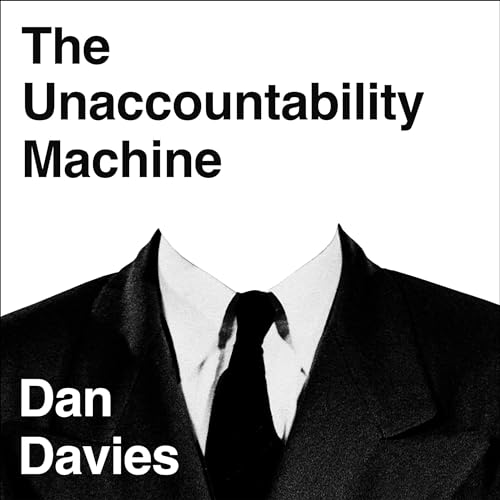The Unaccountability Machine
|
’Tis neither malice, spite, nor virtue
Whose ledger swells, or plucks, the seedy fruits of progress —
But mainly accident.
Lest thee with surety know aught else —
Withhold thy assignations.
The Unaccountability Machine: Why Big Systems Make Terrible Decisions - and How The World Lost Its Mind — Dan Davies, 2024.
Business administration is broken
The epic judicial processes of 2024 have been Tom Hayes’ appeal against LIBOR rigging, about which we have had much to say elsewhere, and the Post Office Horizon IT scandal. Both are resolving to the question: to what extent can we put this absolute shower down to the nefarious, or just bone-headed, interventions of individual operators.
Yet, much of the engineering of business administration — you hardly need an advanced degree in operations research to know these days, there’s a lot of it — exists specifically to prevent bad apples, or stupid apples, subverting our complex modern organisations and systems.
Much of modern business administration is a catalogue of a singular failure to achieve that basic end. Our roll of honour refers. LIBOR rigging and the sub-postmasters débâcle are but pinnacle examples. With all that infrastructure, superstructure and supervision how were a band of relatively lowly trading staff able to run riot?
Where were all the barking dogs?
With all its infrastructure, internal and external legal advice, consultancy, and, er, second sight, how did no-one stop to think something must be wildly, catastrophically, wrong with the Post Office’s theory of the situation? How did no-one, even once, applying Otto’s razor?
About those rogue apples
Either these are peculiar, localised problems — rogue gangs of bad apples — or the prevailing business administrative paradigm is in crisis and we need another theory of the game.
Because it relieves executives of accountability and leaves only a deniable residue of responsibility for hiring them in the first place, “bad apples” is always the preferred diagnosis. The paradigm being in crisis, by contrast, suggests senior executives take credit for all the good stuff, dodge the rap when things go tits up and live a charmed life never being honestly marked to measure for anything. They are a waste of money, in other words.
LIBOR submitters fit the “rogues gallery” identikit nicely. By making microscopic adjustments that no-one else would notice, they (allegedly) stood to make multimillion pound bonuses for themselves. It was almost a victimless crime.
The post office middle managers do not. If they had anything to gain personally from vilifying oppressing these pillars of the community nationwide, it was indirect and paled in comparison to the city bonuses on offer to the LIBOR submitters. These people do not resemble “bad apples”. They seem unremarkable, familiar, rather mediocre office workers.
Watching these individuals give evidence, two things occur: firstly, the weave of life’s tapestry wouldn’t have needed to be that different for these witnesses themselves to have been sub-postmasters, on the other end of this outrage. None more so than CEO Paula Vennells, a middle-English lay Methodist, who even looks like a sub-postmaster.
Secondly — there but for the grace of God go I. Post Office inhouse legal head Rodric Williams is a fifty-something expat New Zealander, whose career trajectory seems strikingly similar to JC’s. In the halogen glare of cross-examined hindsight, his actions might seem regrettable, but we should ask ourselves: knowing what he knew then, would we have done any differently? We should not kid ourselves here.
